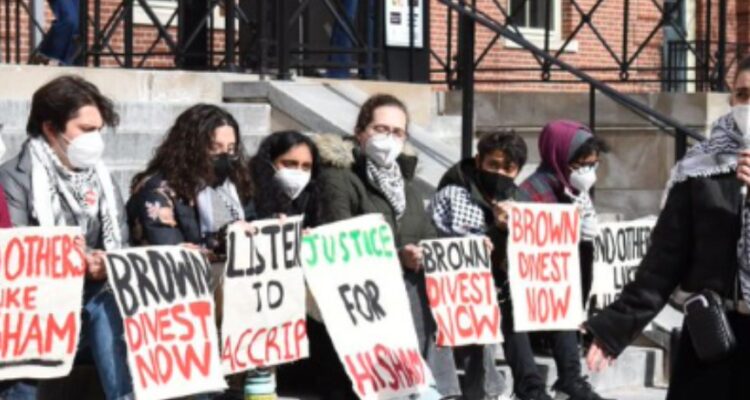Nineteen students initially took part in the hunger strike.
By Andrew Stiles, The Washington Free Beacon
Earlier this month, a handful of Brown University students launched an “indefinite hunger strike” with the goal of forcing the Brown Corporation to consider a resolution to divest the school’s endowment from companies tied to Israel’s war on the terrorist group Hamas.
It lasted about a week.
The remaining hunger strikers abandoned their protest shortly before dinner time on Friday, Feb. 9, after eight days without food. Brown’s president, Christina Paxson, firmly rejected their demands ahead of the corporation’s board meeting on Feb. 8, and the students didn’t see the point in continuing to starve themselves “with now-obsolete demands.”
During that meeting, in an effort to show support for the hunger strikers and bring “attention to the ongoing genocide that Brown invests in,” several dozen Brown students lay down in the grass and pretended to be dead. It was very inspiring.
Nineteen students initially took part in the hunger strike. Two dropped out before the group called it quits after eight days. Some of the protesters explained their motivations in interviews with the Brown Daily Herald. Senior student Kalikoonāmaukūpuna Kalāhiki, a native Hawaiian who uses they/them pronouns, cited belief in “global Indigenous solidarity,” as well as the ability to “deeply empathize with the erasure of native culture.”
Kalāhiki wore a keffiyeh—the black-and-white checkered durag commonly associated with anti-Semitic terrorism—while discussing how her ancestors have helped her survive the hardship of going two days without food. “I know that my body is literally the culmination of their existences, and I am now using my body as a tool for liberation,” Kalāhiki told the Daily Herald.
Brown sophomore Maize Cline, a Jewish student from Berkeley, Calif., bragged that her synagogue back home was one of the few to have publicly called for a ceasefire. “We as Jews have a responsibility to do something,” said Cline, who belongs to the Brown University chapter of J Street. “We have the autonomy to be able to oppose the state of Israel.”
Another sophomore, Felora Bellamy (they/them), told the Daily Herald that joining the hunger strike was an easy decision because “Palestinian liberation is very intertwined with Black liberation,” and because Bellamy hoped the protest would force the Brown Corporation to take action.
“As a Black person living in this world for 19 years and having my identity politicized in very violent and racist ways, I felt like it was incredibly natural to align my solidarity with Palestinians who have also been given that burden of having their identity politicized,” Bellamy said.
Perhaps the most amusing aspect of the failed hunger strike was the “solidarity” protest that took place at Harvard last Friday, when several dozen pro-Hamas students skipped lunch refused to eat for 12 hours. By expressing solidarity with the hunger strikers at Brown, students at Harvard, Yale, and the University of Chicago were attempting to “prove to university corporations that we will not back down.” (Fact check: They did back down.)
We can’t stop laughing.





